Despite producing 500,000 tons of salt annually, Senegal still grapples with iodine deficiency.
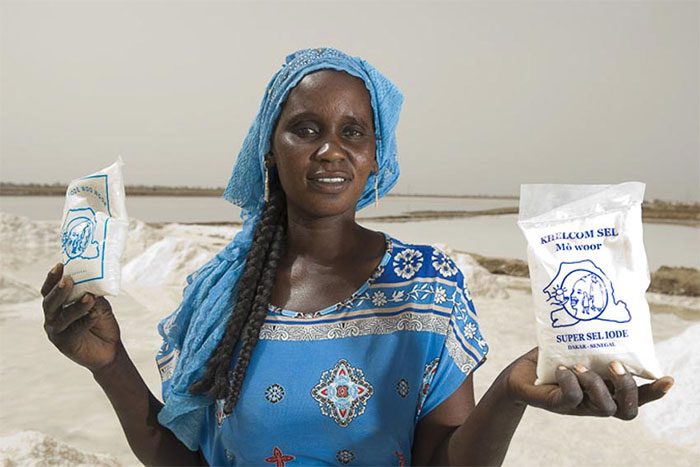
Marie Diouf.
Marie Diouf, 35, is conversing on the phone in Wolof, the indigenous African language of Senegal.
Wearing a red boubou (a traditional long, loose robe of Senegal), Diouf stands out against the serene backdrop of white salt. The sun is gradually setting on the horizon, casting an orange hue over the salt fields in Fatick, located in the southwest of Senegal. Diouf stands with her hands on her hips, observing a group of strong young men chiseling away at a hard salt mound.
“When I see the men owning land, I think, ‘Why not me?'” Diouf says, gesturing across the vast plain dotted with ancient baobab trees. In the distance, nestled among dry corn fields, lies her village of Ndiemou. The name Ndiemou means “Salt” in the local Serer language.
When Senegal privatized land in the region in 2000, Diouf became the first woman to invest in land. This was a bold move in this West African nation, where women have limited access to property despite being the primary labor force in agriculture.
During the peak harvest season from February to April, hundreds of women work tirelessly in the salt fields under sweltering weather, with temperatures exceeding 40 degrees Celsius. They labor to scoop the crystalline mineral into baskets, which they then carry on their heads. Yet, they do not financially benefit from salt production.
This is an inequality that Diouf finds unacceptable!
“When I started, men told me I wouldn’t last long, but I told them that everything a man can do, a woman can do too,” Diouf recalls.
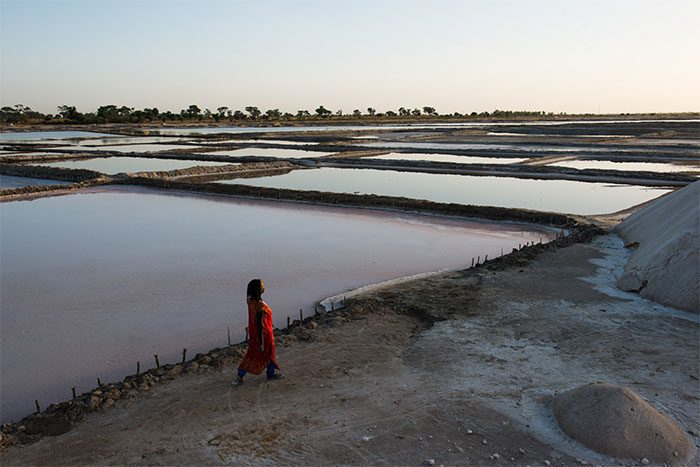
Diouf walking along her salt field in Fatick.
Now, she is the employer, hiring dozens of women and men—including her husband—to produce about 4 to 5 tons of salt each day during peak season by drawing water from a nearby river, allowing it to evaporate to leave behind white salt.
“At home, my husband is the breadwinner, but here, in the salt fields, I am the manager,” Diouf says, breaking into laughter.
A Paradoxical Reality
The same year Diouf rented out her land, a presidential decree in Senegal mandated that all harvested salt in the country must be iodized. This public health strategy is widely regarded as the most effective way to prevent iodine deficiency, which can cause goiters, developmental delays, and cognitive impairment.
These health issues have long plagued certain regions of Senegal. This method is also considered the cheapest; each ton of salt requires about 170 grams of potassium iodate, costing just $4.25.
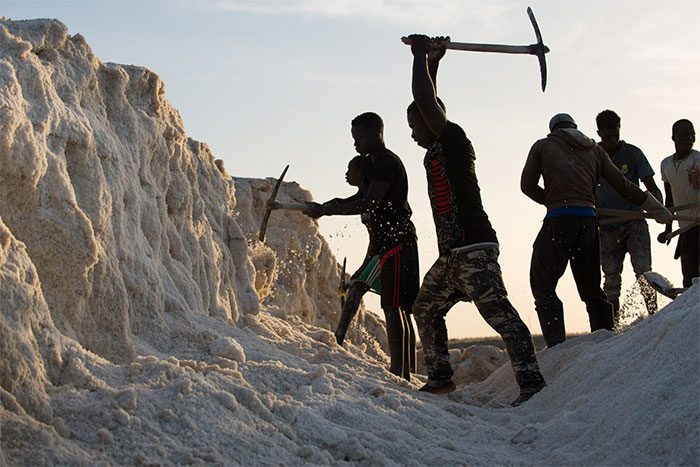
Young men carving hard salt on Diouf’s land in Fatick.
In most developed countries, table salt has been iodized for centuries. This is why the term “iodine deficiency” is hardly mentioned in places like the United States.
But not here, in this West African nation.
Despite being the largest salt-producing country in West Africa (Senegal extracts nearly 500,000 tons of salt annually), iodine deficiency remains a pressing issue nationwide.
Experts attribute this to quality control issues. Most Senegalese obtain salt from small-scale artisanal harvesters, like Diouf. Their output accounts for about one-third of the country’s total production. However, due to a lack of knowledge about iodine, most fail to produce iodized salt effectively.
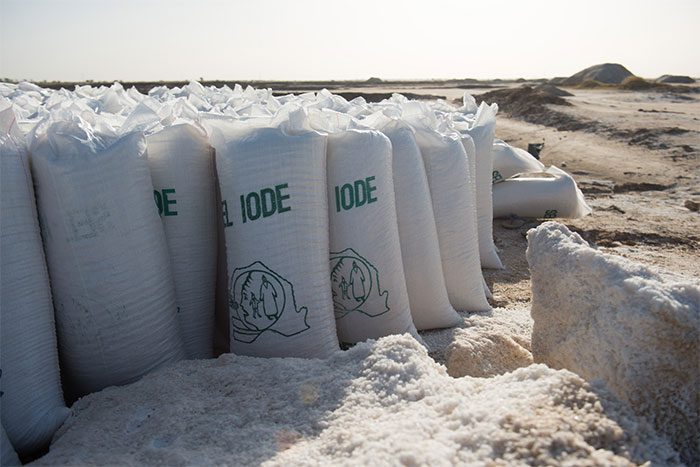
Bags of iodized salt ready for distribution.
Quality issues have prompted the Iodine Global Network, the Global Alliance for Improved Nutrition, and other organizations to advocate for Senegal to shift from supporting small-scale producers to industrializing iodized salt production.
A 2015 survey revealed that only 37% of households in Senegal had access to adequately iodized salt, with the situation worsening in rural areas.
Iodine plays a crucial role in enhancing brain development in young children, especially during the fetal period. In 2015, 30% of pregnant women in Senegal were iodine deficient, according to the same survey.
Without adequate nutrition, pregnant women risk miscarrying or giving birth to children with permanent neurological damage. Even mild iodine deficiency can reduce a child’s IQ by 10 to 15 points.
Besides iodized salt, there are other sources of iodine, including seafood, dairy products, and cereals (depending on the type of soil where they are grown). However, in rural areas of Senegal, these foods are not always part of the regular diet, especially for those struggling with poverty and food security.
The Salt Queen of Senegal
Faced with this glaring injustice, Diouf, supported by the Canada-based NGO Nutrition International, has embraced the title of entrepreneur and local advocate. She goes door-to-door to raise awareness about the importance of iodine.
As a result, the village of Ndiemou, where she is known as the “Salt Queen,” has undergone a complete transformation, despite nationwide data showing that wherever salt is produced, access to adequately iodized salt is often limited.
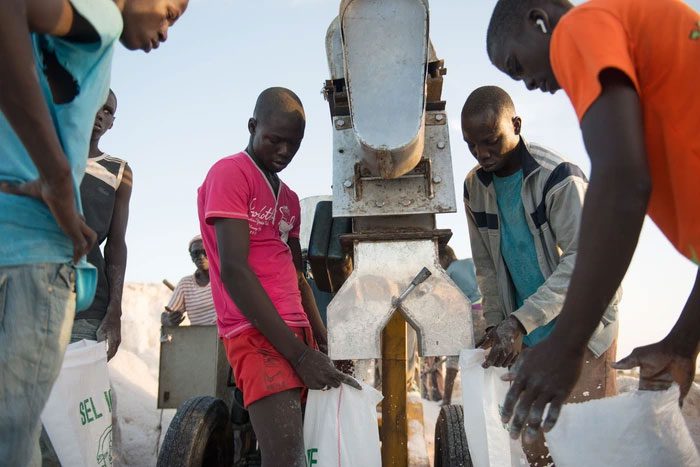
Workers for Diouf use a mixer funded by the NGO Nutrition International to blend iodine into salt before packaging.
According to a 2015 study by the Senegalese government, only 11% of the population living in salt-producing areas used iodized salt. This figure rises to 53% in urban areas.
Adama Nguirane, a project member implementing the government’s iodized salt initiative, noted that this discrepancy is due to several factors, primarily a lack of outreach. It is challenging to persuade people to buy iodized salt when their homes are filled with readily available salt.
Nguirane stated that this is why attracting women like Diouf into the iodized salt supply chain is crucial, as they are the ones preparing meals for families and caring for children.
Before long, Diouf’s village was “updated” on iodine awareness. Women became “enlightened” about this essential nutrient, happily purchasing iodized salt to prepare nutritious meals for their families. From that point, Diouf was dubbed the “Salt Queen.”
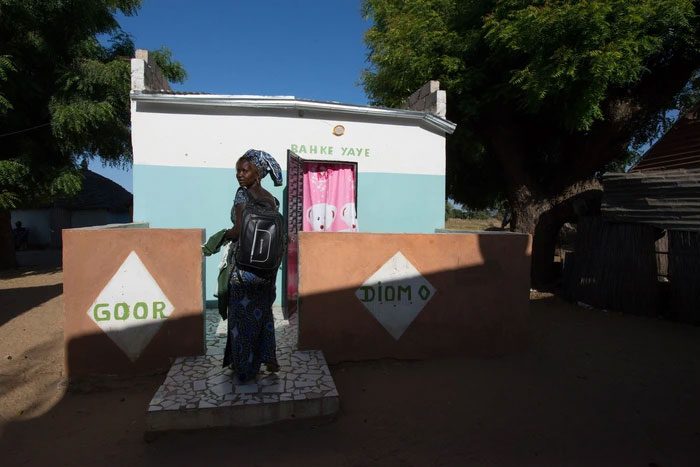
Diouf outside her home in Ndiemou.
“I believe in the development of my country, and it is essential that we address this issue for our children and their future,” Nguirane said. “Diouf is a role model, and we look to her to guide us.”
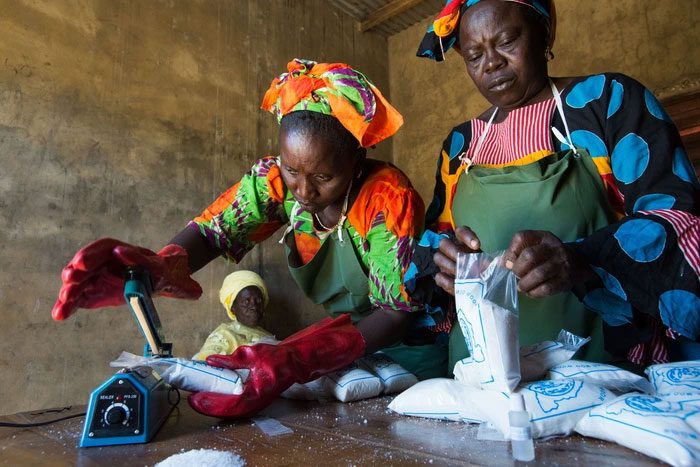
Ndeye Faye (left), checking iodine levels in salt before packaging. Marie Diouf employs women to work in her small iodized salt production and packaging business.
Pape Coumb Ndoffene Faye, the principal of the Ndiemou primary school, noted a significant difference in student performance due to Diouf’s efforts.
Faye said, “Since the project began, I know that the children have been fed iodized salt at home and in the cafeteria, and indeed their intelligence has improved.”
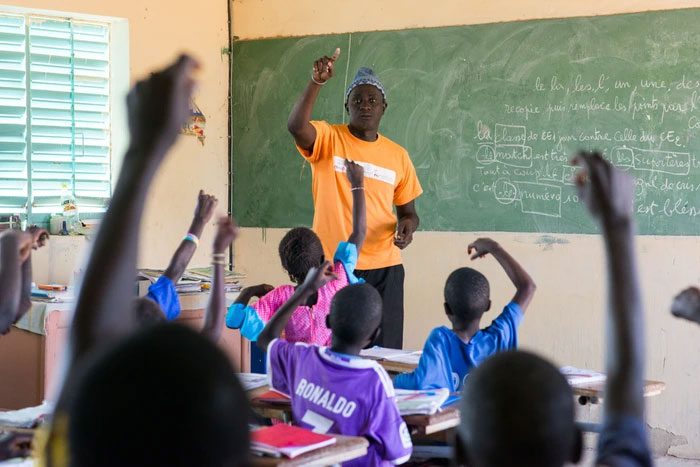
Pape Coumb Ndoffene Faye, principal of Ndiemou primary school, with his students during French class.
Gradually, not only the people of Ndiemou but those across Senegal began purchasing iodized salt for use. Small-scale salt producers are also actively learning iodized salt production technology.
Diouf has high hopes for her 13-year-old daughter Fatou, who has graduated from Ndiemou primary school. Now, she walks about 4 kilometers to junior high school each morning. Diouf dreams that one day her little girl will become a powerful CEO, a diplomat, or even the first female president.
Her aspirations may seem distant, but there is a sense of hope. Senegalese President Macky Sall was born in the city of Fatick, located less than 10 kilometers from the village of Ndiemou, where he served as mayor from 2009 to 2012. The local residents take great pride in his achievements.


















































